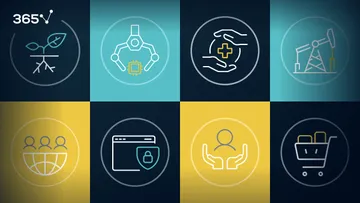Rapid technological advancements have led to the quicker adoption of AI in businesses, governments, and our daily lives. AI careers are becoming more and more sought after. And the number of jobs in AI keeps growing, indicating a sustained appetite for talent—although it’s still limited to larger companies that can afford AI and machine learning specialists.
This article examines the career prospects, job opportunities, and AI professionals’ median salary. We present several roles and the core skills needed to set yourself up for success in each one.
Table of Contents
- What Is the AI Job Outlook?
- What Is the Salary Range for AI Jobs?
- What Are the Best AI Jobs in 2025?
- Best Jobs in AI: Next Steps
What Is the AI Job Outlook?
With the technological advancements and growing need for automation, jobs in AI are becoming more and more sought-after. And companies are looking for skilled professionals that understand the underlying logic and ethics of artificial intelligence. Specialists must be able to deploy algorithms into the organizational workflow to drive business growth and innovation while adhering to best practices.
After the launch of ChatGPT, the search for generative AI roles has increased exponentially, and the related job postings have doubled compared to 2022. And while this is primarily due to the buzz around OpenAI’s chatbot, the demand for AI professionals has been increasing steadily over the past few years.
According to the Artificial Intelligence Index Report, AI jobs comprised 0.9% of all job postings in the US in 2021 and 2.1% in 2022. In addition, the Future of Jobs Report 2023 predicts a 40% increase in the demand for ML and AI specialists from 2023 to 2027.
What Is the Salary Range for AI Jobs?
According to Payscale, the average pay for jobs requiring AI skills in 2025 is $134,000/year. And although the earnings vary significantly depending on the experience level, company size, industry, location, position, etc., salaries are big across the board.
What Are the Best AI Jobs?
You can pursue several career paths in AI depending on your needs, skills, and experience. There are engineering and scientific positions for the AI jobs listed below.
The main difference is that scientists usually come from academic backgrounds and focus on developing new machine learning models and approaches. Meanwhile, engineers apply these algorithms to real-world solutions.
Machine Learning Engineer/Scientist
Machine Learning Engineer
Machine learning engineers are technically proficient programmers that build AI systems (among other ML applications). They leverage huge datasets to generate and develop algorithms able to learn and make predictions.
This AI position involves organizing data, executing tests and experiments, and optimizing processes and machine learning systems’ performance. There is a growing demand and an excellent job outlook for this role. Our recent research covers in detail the skills and education needed to become an ML engineer.
Machine Learning Scientist
Machine learning scientists develop and implement new ML methods and algorithms and test their ability to solve different research problems.
ML researchers usually come from academia, often holding a PhD in machine learning or a related field. They possess a strong theoretical understanding of machine learning, mathematics, and statistics and solid computer science, programming, data analysis, and visualization skills. Being up to date with the latest academic literature is also crucial.
Deep Learning Engineer
Deep learning engineers carry out various data engineering, modeling, and deployment tasks, including:
- Defining requirements, collecting, labeling, inspecting, cleaning, augmenting, and moving data.
- Training deep learning models, defining evaluation metrics, searching hyperparameters, and reading research papers.
- Converting prototyped into production code, setting up a cloud environment to deploy the model, improving response times, and saving bandwidth.
This AI position requires the standard ML engineer skillset and profound deep learning knowledge. It focuses on AI applications like speech recognition, natural language processing, and computer vision. Additionally, DL engineers need expertise in topics like neural network architectures, fully connected networks, CNNs, RNNs for visual or speech tasks, etc.
Computer Vision Engineer/Scientist
Computer Vision Engineer
This AI career involves processing and analyzing large data populations and automating predictive decision-making through visuals to solve real-world problems. Computer vision engineers commonly work with object-oriented software, develop apps, write and apply computer vision algorithms, and implement system improvements.
Other common tasks involve:
- Create, test, debug, deploy, and maintain computer vision algorithms and hardware for different environments.
- Develop automated vision algorithms, especially for robotics and autonomous hardware systems.
- Gather analytics from computer vision algorithms and improve their performance.
- Study real-world problems and propose solutions.
- Build technical documentation for computer vision systems for end-users.
- Manage large- and small-scale computer vision projects, define requirements, prepare budgets, and run technical development teams.
If you wish to become a computer vision engineer, you’ll need a strong knowledge of mathematics, calculus, linear algebra, ML libraries, and programming languages such as C++, Python, and Java.
Computer Vision Scientist
Those interested in academic AI careers might consider becoming computer vision scientists. This role involves developing algorithms for research problems and optimizing current techniques for new tasks and research areas.
Computer vision scientists’ main responsibilities include:
- Research, design, implement and evaluate novel computer vision algorithms.
- Work on large-scale datasets, creating scalable, robust, and accurate computer vision systems in versatile application fields.
- Actively disseminate research outcomes in premier conferences and journals.
Computer vision scientists typically hold a master’s degree or a PhD in computer vision or machine learning. They possess solid theoretical deep learning knowledge and strong programming skills in Python or C++. Having published your work in computer science journals will also help you land such an AI job.
NLP Engineer/Scientist
NLP Engineer
Natural language processing (NLP) engineers develop and maintain systems that can analyze human language, extract meaning, determine intent, etc. Sometimes, they work closely with computer programmers and software developers to create artificial intelligence systems that mimic human behavior.
NLP engineers have a wide range of responsibilities, such as:
- Designing NLP systems in a production environment
- Defining appropriate datasets for language learning
- Using effective text representations to transform natural language data into useful features
- Developing NLP systems according to requirements
- Training the developed model and running evaluation experiments
- Implementing the right algorithms and tools
- Performing statistical analysis to refine models
- Keeping up to date with machine learning news and developments
- Maintaining NLP libraries and frameworks
- Monitoring the performance of existing applications and identifying potential problems
As an NLP engineer, you need a strong understanding of text representation, semantic extraction techniques, data structures, and modeling. You must be able to design effective software architecture and write robust and testable code.
NLP Scientist
The academic natural language processing career path involves developing novel NLP algorithms and techniques to solve problems like information extraction, text summarization, natural language generation, automated question answering, etc.
The tasks may vary depending on the research group or your domain of work. In addition, NLP scientists closely monitor the existing relevant literature and align, compare, and contrast their work with state-of-the-art techniques and algorithms.
You need a PhD in computer science or a related field, scientific publications, and/or successful product development to become an NLP scientist. Having a hands-on experience with NLP solutions, software prototyping in a research environment, and Python programming is also mandatory.
Robotics Engineer/Scientist
Robotics Engineer
Robotics engineers create, assemble, and maintain robotics technologies that facilitate or automate various tasks. AI and robotics overlap when it comes to teaching machines to perform these tasks using ML and computer vision algorithms. Ultimately, the goal is to design robotic systems that work autonomously.
Robotics engineers assemble, test, and evaluate the effectiveness of various designs throughout their lifecycle and troubleshoot the prototypes where needed. As such, they need a solid understanding of AI interfaces, the parameters of robotic applications, the robots’ components and functionalities, etc.
Robotics engineering is one of the most complicated jobs in AI. It requires expert knowledge of mechanics, electronics, and computer science, and proficient skills in advanced mathematics (algebra and calculus), geometry, physics, and computer programming. This knowledge will help you better understand the abstract concepts and the role of AI in this field.
Robotics Scientist
Robotics scientist positions can vary widely, but every role incorporates heavy AI research. Researchers develop novel decision-making methods to solve automation tasks, enabling robots to understand and perform them autonomously.
As a robotics scientist, you’ll develop computational methods and algorithms for reinforcement learning, planning under uncertainty, and decision-making in multi-agent systems.
So, what are the requirements for this artificial intelligence career?
Robotics researchers usually hold a master’s degree in robotics, computer science, machine learning, artificial intelligence, control engineering, mechatronics, or applied mathematics. They also have excellent programming, mathematics, and ML skills.
Data Scientist
Data scientists’ primary role is to help organizations make informed decisions, improve their operations, and promote a data-oriented culture. They collect, wrangle, analyze, and interpret data. And, depending on the task, they may use AI techniques to analyze and extract insights from large datasets, build predictive models, and automate decision-making processes.
While the job specifics can vary between companies and roles, some common data science tasks involve:
- Data collection: Gathering the necessary information to complete a specific analytical task.
- Data transformation: Manipulating data, measuring its quality, and determining the relevant assumptions.
- Data modeling: Building a suitable model for the task at hand and the collected data.
- Data reporting: Deriving and communicating meaningful insights.
Data scientists need an understanding of mathematics, statistics, and computer science and solid analysis, programming, deep learning, and ML skills.
AI Engineer
AI engineers develop intelligence applications and systems that enhance the performance and efficiency of businesses. They use software engineering and data science to help companies make better decisions, decrease costs, increase revenue and profits, and streamline their processes through automation.
Check out our AI Applications for Business Success course to understand how AI helps companies grow.
Some of the AI engineers’ responsibilities include:
- Collaborating with business leaders and software development teams to determine what business processes can be improved with AI
- Developing the AI process and infrastructure
- Using machine learning and NLP techniques
- Building and maintaining chatbots that interact with customers
- Developing AI-driven solutions to automate repetitive tasks
- Building, training, and optimizing machine learning models
- Creating recommendation engines for shopping sites, streaming services, etc.
- Developing pipelines that structure data for AI processes
The AI engineer job outlook is bright, but this career path is demanding. It requires strong programming skills, a mathematical background (linear algebra, probability, and statistics), big data skills, and hands-on experience in building machine and deep learning algorithms.
Best Jobs in AI: Next Steps
Artificial intelligence plays a significant role in shaping the future of business and society. And its impact will increase as more data and computational resources become available.
If you wish to build a successful AI career, develop a well-rounded skillset. Master data science fundamentals like statistics and linear algebra before progressing onto more specialized machine learning topics.
365 Data Science can help you acquire the necessary theoretical understanding, practical skills, and the business, analytical, and strategic thinking needed for a career in AI. Enroll in our comprehensive program and start learning for free.








